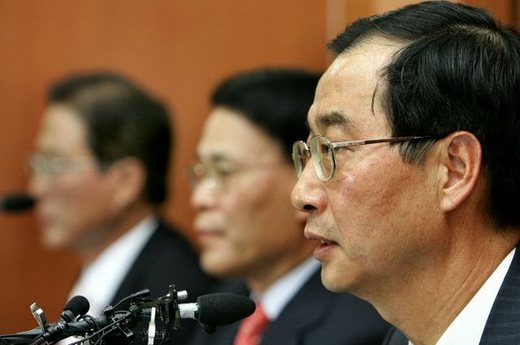Posted on : Jul.1,2006 11:32 KST
So-called "Mofia" behind many crucial company sales, bailouts
Vice-Minister of Finance and Economy Lee Hun-jae suggested that South Korean financial legislation be tightened, citing the recent scandal over U.S.-based equity fund Lone Star's acquision of Korea Exchange Bank at a lower-than-market price. The vice minister suggested the setup of a "Lee Hun-jae fund" to try to protect domestic financial institutions from "falling to foreign capital." Though legislation for such a fund is currently not in place, the vice minister said, "I will talk to the Ministry of Finance and Economy (MOFE) and clear things up, so you guys just worry about gathering the cash," demonstrating the strong influence the vice minister has over South Korean financial affairs.
In fact, the "Clique of Lee Hun-jae" is a phrase commonly used by the media, referring to a close-knit group of officials in important positions within MOFE who revere the vice minister. This group traces their ties to Lee either through having worked with him in the past, or even through attending the same high school and university.
The ultimate source of their power, however, springs from the group of finance officials known as the "Mofia," of which the 'Clique' is a part. Recently, with the audit regarding the sale of foreign exchange banks, the Hyundai slush fund scandal, as well as the implication of current and former finance officials in corruption cases, the necessity for reform of the "Mofia" has become a pressing topic. The word "Mofia" is either narrowly defined as those finance officials who served in the Financial Policy Department under Lee's Ministry of Finance (currently MOFE), or more broadly as all those who have worked within the Ministry of Finance.
The source of the formidable strength of these financial officials springs from their application of existing regulations in the pursuit of their own style of direct financial management. Currently, residential mortgage loans can be stopped with a single word from the Financial Supervisory Service, which is an example of the controversial managerial method employed by the body.
In 2003, with the LG Card company facing near bankruptcy, the Financial Supervisory Commission and MOFE summoned bank executives and effectively forced them to provide financial support to LG Card.
The "Mofia" continues to cling to detailed financial regulations no longer necessary in an attempt to maintain their constant influence. According to one financial official from MOFE, "Korea must develop as a financial powerhouse, and it is the financial officials who are serving as the greatest stumbling block." His diagnosis was that "there are too many unnecessary regulations and directions from above constricting the freedom of finance."
Using its potent influence as a foundation, the "Mofia" holds sway with key officials in the presidential office, the Financial Supervisory Committee, and the Financial Supervisory Service. Furthermore, their ranks occupy affiliate financial institutions and even the upper levels of private financial companies, thus forming an awe-inspiring network of human resources that continues to expand and reproduce. All six chairmen of the Financial Supervisory Committee (launched in 1998 after the reorganization of the Financial Supervisory Institute) came from MOFE or the former Ministry of Finance. Chairmen of three state-run banks, the Credit Guarantee Fund, the Kibo Technology Fund, the Federation of Banks, the Life Insurance Association, the Non-Life Insurance Association, and the Korean Federation of Savings Banks are all members of the "Mofia." While most of the "Mofia" trace their ties to their days at Kyunggi High School and Seoul National University, th ese 'informal relations' exert a strong influence on actual financial operations, as well. Many years ago, a trade union raised protest that an official in their securities institution was hired based upon his connections to MOFE, but after the official took his position, they changed their tune and began requesting that an even higher-up MOFE official be placed in a union leadership position, for fear that they would lose sway.
One Financial Supervisory Service official stated, "In any case, if an 'outsider' officer is installed, it will only isolate us."
Additionally, in such an atmosphere of comity and mutual assistance among senior and junior colleagues, it is not easy to raise an alternative voice. One former high official stated, "I have made more money in the three years since I quit than the money I made in 30 years of public service," confiding that "if one falls out of favor with one's senior colleagues, it is possible that one will lose one's position."
The dramatic decline in the restraining power of the former Economic Planning Committee and presidential economic specialists is seen as a primary reason for the "Mofia's" solo rise to dominance. Moreover, as secrecy is the custom in finance and closed-door sessions are the norm, there is room for corruption to intrude. One person from the finance world commented, "All financial officials are always working for the public good, but there are many times when public and private interests overlap." He continued, "behind the maintenance and operation of the legal structure, there are many hidden cases of fierce lobbying by special interest groups."

